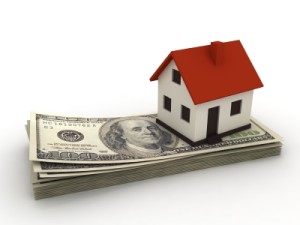Sometimes my logic just doesn’t add up. When ever I think about the Fox family’s retirement, or when ever I work with clients and discuss their retirement, I never consider the value of our/their home. That seems crazy, especially when you look at national statistics. The average American has a net worth of $80k, of which about $55k is their home equity!!! That means that for the average American 70% of their net worth is in their home, yet that’s something I don’t incorporate when I think about retirement. What gives?
Your home as an investment
To start, it’s worth thinking about your house as an investment. As investments go, especially over the long-term, houses don’t perform nearly as well as other types of investments like stocks (I did a whole blog on this point).
You’re always going to hear stories about people who made a killing when they sold their house. Like fish stories, you only hear about the “wins” and not from the people who didn’t do that well. Also, a lot of people think about the “gain” of the sale, comparing what they originally bought the house for and what they sold it for, yet they don’t factor in all the maintenance and home improvements they put in.
The point is that I think most people and certainly the mass media tend to romanticize the idea of houses as an investment. I think the performance is much more modest.
Your home as a shelter
Obviously, your home serves a very practical purpose as a shelter. It keeps the rain off your head, protects you from the bad guys (as Mini Fox would say), provides storage for your crap, etc. That’s the rub, and makes your home fundamentally different from other, more traditional investments like mutual funds or other securities.
Even in retirement you need that shelter, so it’s not like you can sell your home and use the proceeds to fund your lifestyle (actually, maybe you can, but there’s some deep water there that we’ll talk about in a few minutes). So you’re stuck in the middle—you need the shelter your home provides, but your home represents a large portion of your savings nest egg. What to do?
Options (and why they are problematic)
As we’ve discussed, you’ll probably need about $5000 to $10k per month in retirement to support a moderate, middle-class lifestyle. That will go to food, vacations, healthcare, and all the other stuff you’ll need. Oh, by the way, you’ll also need shelter—a roof over your head—so let’s think about how that would go.
Option 1—At some point, maybe when the kids leave the house, you can sell the home you own, take all the equity and put that into your investments, and rent for the rest of your life. This isn’t a very popular option, yet I think it has a lot of really positive features (see my comparison of renting versus buying). The proof of the pudding is in the eating, and very, very few retirees with at least a moderate investment portfolio do this.
Option 2—When the kids leave you can downsize, selling your larger family home for a smaller one that accommodates two older people rather than a nuclear family. This allows you to get a less-expensive home, pocket the equity and put that money in your investment portfolio, and go forward. This allows people to use that home equity to support their retirement, but the problem is still there, albeit smaller. You still will own a home that ties up a bunch of your net worth.
Option 3—Do a reverse mortgage. This is a bit of an obscure strategy with a number of complexities that probably deserves its own post. Basically, you take your home equity and borrow against it—let’s say taking out $3000 per month to fund your lifestyle. There are a lot of details here with a lot of fees (that make it less attractive), plus it “forces” you to stay in your home which may be a good thing or a bad thing. That said, this solves a lot of the problems we discussed.
What does it all mean?
It’s clear there are some complexities with this, and I don’t think there’s a clear approach that you should take. Counting your home equity in your net worth can definitely expose you to not having enough liquid funds to pay for things like food, healthcare, etc.
On the other hand, not counting that money at all seems to be really, really conservative. After 30 years, our mortgages will be paid off and we’ll have an asset that is potentially worth hundreds of thousands of dollars. That needs to be incorporated somehow, right?
Basically, I calculate everything as though there is no home equity. When I look at the Fox family’s financials or those of the clients I help, I know that what ever those numbers (just the investments) say, there’s some upside. It’s a stupid game we play with ourselves, but that’s how I do it. If our finances were so close (what I had was right at what I needed), I would definitely start dissecting the home equity value more.
Usually, though, I set the goal for myself and my clients that their investment accounts (brokerage, IRA, 401k, etc) should be enough to fund their retirement. Then their house can be upside which gives a bit of a cushion for posher retirement or for unexpected expenses which may arise.
Sweet—a really important item in personal finance that defies an easy answer. That’s how I do it. How do you think about your home equity?
